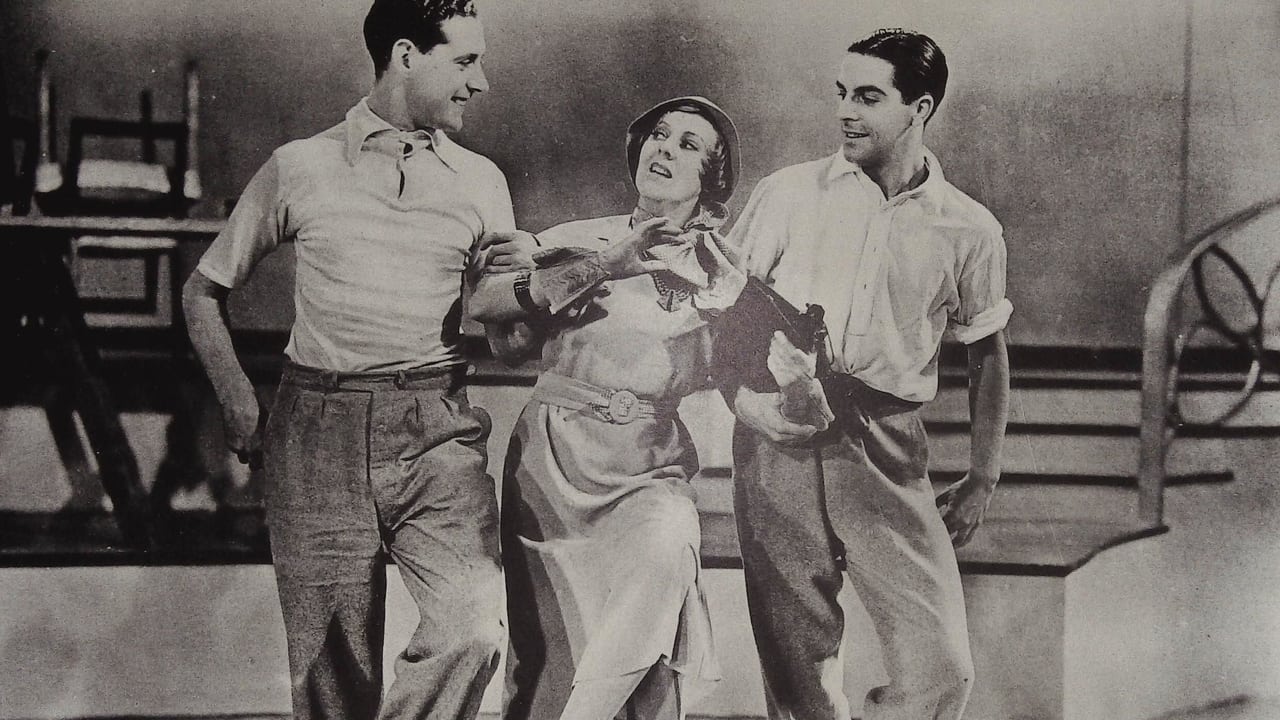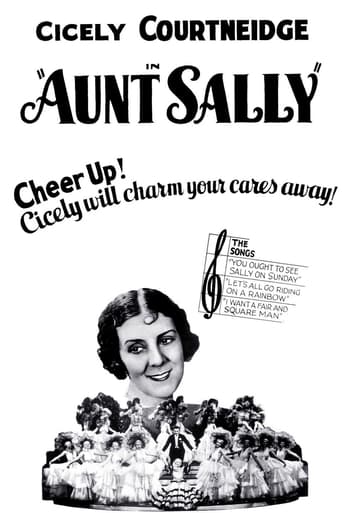

Thanks for the memories!
... View MoreAm I Missing Something?
... View MoreIt's a mild crowd pleaser for people who are exhausted by blockbusters.
... View MoreI gave this film a 9 out of 10, because it was exactly what I expected it to be.
... View MoreSam Hardy came from New York to London so he could run night clubs without gangsters muscling in on his business. The gangsters followed to muscle in. Then along came Sally in the person of Cicely Courtneidge to audition, for Hardy, only to be promptly tossed out.Promptly getting a job as Hardy's parlor maid, she reinvents herself as a French cabaret star and fascinates Mr. Hardy, who decides to star her.... until the gangsters decide to sabotage everything by kidnapping the chanteuse.The songs in this musical number have not aged well, but they are pretty good for the era, and Miss Courtneidge's mugging and serio-comic Apache dance will please people with a bent for such matters. I was particularly taken by the big production number, "You Ought to See Sally on Sunday." The huge variety of camera angles, including the overheading crane shots, suggest Busby Berkley, but it never loses itself in fantasy, despite the dizzying perspectives. It all clearly takes place within the generous confines of the night club space, even when optical printing offers multiple images. It's a nice variation never pursued in Hollywood.
... View MoreOkay, it was 1933, what do you want, slick, sophistication or sloppy slapstick. Well, you may want the first but you'll have to settle for the second. In its favor the film boasts four half-decent songs from the pen of Harry Woods and if you like Cicely Courtenidge you'll be in Hawg Heaven. This time around she was working without a net which is another way of saying she was without her usual partner (and also husband) Jack Hulbert, who could always be relied on to provide a shot of urbanity to offset her slapstick. The plot is about as believable as any musical plot in thirties Britain, in other words don't expose it to a strong light lest it disintegrate in front of your eyes. Given the time - the Great Depression - it was probably as good a slice of escapism as anything else.
... View MoreI suspect that one's enjoyment of this comedy probably stands or falls on one's feelings about Miss Sally Bird: the Cinderella-plot requires that this zany matron, with her arch expression and incipient double chin, should triumph over her younger, prettier rival, and secure stardom and the heart of her employer thanks to her indomitable persistence -- and, of course, her Wonderful Personality.Unfortunately Cecily Courtneidge takes the character so far over the top that it's hard to see how anyone could fall for her -- it's not so much a wonderful personality as an extremely irritating one. Given the allure of the exotic (and the hilariously camp persona she then adopts) I can more or less swallow King Kelly's falling for the 'Zaza' act, and even for the woman behind it: but as soon as Sally launches into the revue numbers in her 'own' persona, I was expecting to see her sacked on the spot -- she may be brimming with self-belief, but Miss Bird's act is so broad that the character simply comes across as lacking in talent.When she is carrying out her escape -- however it may strain the bounds of plausibility -- she is actually quite resourceful and likable. I don't personally care much for slapstick, but that is not Miss Courtneidge's fault, and she certainly flings herself into her Apache act with admirable abandon (although a good deal of judicious cutting suggests that this sequence was not as stunt-heavy as it appears) and has no qualms about displaying a well-muscled pair of legs. But I'm afraid I just don't find the Sally Bird style of comedy funny.The other problem I have with this film is its reliance on a weak 'American' gangster plot to drive the action. Although other pictures of the era supposedly include transatlantic sequences to boost sales to the US market, it's hard to imagine that this sort of laboured 'Noo Yoik' material can have improved the film's reception among American home audiences, and as a plot device it's a cheap indulgence. (One notes that the American night-club entrepreneur is conveniently endowed with an impeccably English son to ease the accent burden somewhat!)There is little character development, and I never really became engaged with any of them, making such episodes as Billy getting shot or Queenie betraying Sally to the gangsters merely exercises in plot mechanics rather than carrying any emotional weight. And since neither Kelly nor Sally are presented as particularly likable characters, it's hard to understand why she should pursue him so hard, let alone why we should care about the outcome of the romance. The dance sequences appear somewhat cramped and not particularly imaginative, and the songs (by the same Harry Woods who would serve Jessie Matthews so well), while pleasant, seem nothing very special.Having said all that, however, I must hasten to add that the film is not the complete disaster that the above comments might appear to suggest. The juvenile leads are a pleasant couple (although under-used), there are moments of genuine humour, and ultimately, although it has its deficiencies, the entertainment value of "Aunt Sally" manages to survive its annoyance factor. I admit that I had hoped for rather more on my first viewing of the famous Cecily Courtneidge, and I wouldn't recommend that anyone go out of his way to see this picture, but in the end I did quite enjoy it: a "don't switch off" rather than a "seek out at all costs" verdict.
... View MoreAs a female comedian, Cicely Courtneidge's performing style was somewhere between those of Lucille Ball and Carol Burnett. Like both of them, Courtneidge tried to get laughs out of elaborate costumes, in her case involving ludicrous over-sized hats. As with Joan Davis (who was much funnier and far sexier), Courtneidge's comedy routines often involved dancing and slapstick. Her stage and film comedies always involved extremely contrived plot lines. Her career peaked at roughly the same time as Bea Lillie's, and these two performers were frequently compared. But in fact Bea Lillie's most famous routine -- the 'double dozen double damask dinner napkins' -- was originated by Cicely Courtneidge (which explains why Lillie never performed this routine in Britain). Courtneidge's usual sidekick in her antics was her husband Jack Hulbert, who complemented her in roughly the same way that Desi Arnaz backed Lucille Ball. Hulbert was dark, handsome, urbane, and made some attempt -- never successful -- to keep his wife's antics earthed in reality.Very late in her life, Cicely Courtneidge gave a deeply touching dramatic performance in 'The L-Shaped Room', as a wistful old lesbian from the variety halls. Regrettably, this one good performance was preceded by several decades of daft slapstick. It's not surprising that the Monty Python gang used Cicely Courtneidge's name to get a cheap laugh in one of their comedy routines.'Along Came Sally' lacks Jack Hulbert but is otherwise absolutely typical of Courtneidge's work. She plays Sally Bird, an Englishwoman who combines the worst traits of the characters played by Gracie Allen (she's brainless) and Lucille Ball (she's got the showbiz bug but is utterly untalented). Sally applies for a job in a London nightclub, only to discover that some American gangsters (with guns!) are trying to take over the joint. Of course, she decides to stop them. Somehow, this involves her pretending to be a French performer from the Folies Bergere, cried Mademoiselle Zaza. That name is funnier than anything else in this movie.The most interesting thing about 'Along Came Sally' is this film's depiction of American gangsters, with all the English stereotypical perceptions of such characters. The gangsters are played tolerably well by American actors, including Sam Hardy as the gang's leader. One of the henchgoons is well-played by Ben Welden, a semi-Edward Brophy character actor from America who got his start in British films before showing up at Warner Brothers. Less well-cast here is Hartley Power, an American character actor long resident in Britain, who usually played ineffectual roles. It doesn't much help that the American gangsters' dialogue is filled with Anglicisms. As 'Zaza', Courtneidge's attempts at a French accent are laughably bad without actually being funny. This entire movie bears an odd resemblance to the Groucho Marx/Carmen Miranda movie 'Copacabana', made a few years later.I'll rate 'Along Came Sally' 3 points out of 10, mostly because I'm a fan of 1930s comedy in general. This film is firmly in that mode, but not nearly up to the high comedic standards of that decade. For some reason, 'Along Came Sally' is listed on IMDb as 'Aunt Sally'. In Britain, an 'Aunt Sally' is any empty personality that exists for the sole purpose of being knocked down or ridiculed. Well, that description fits this movie.
... View More